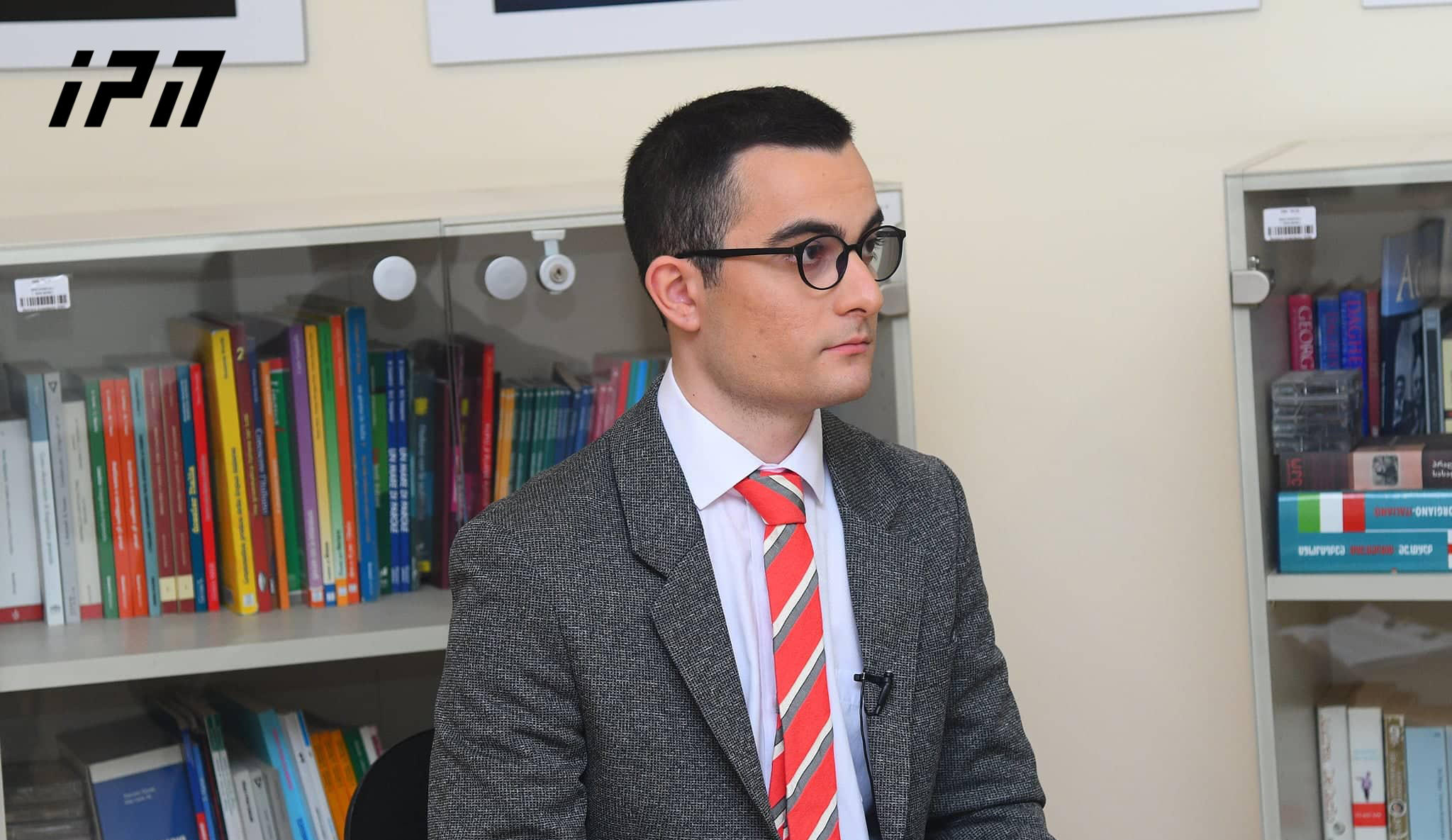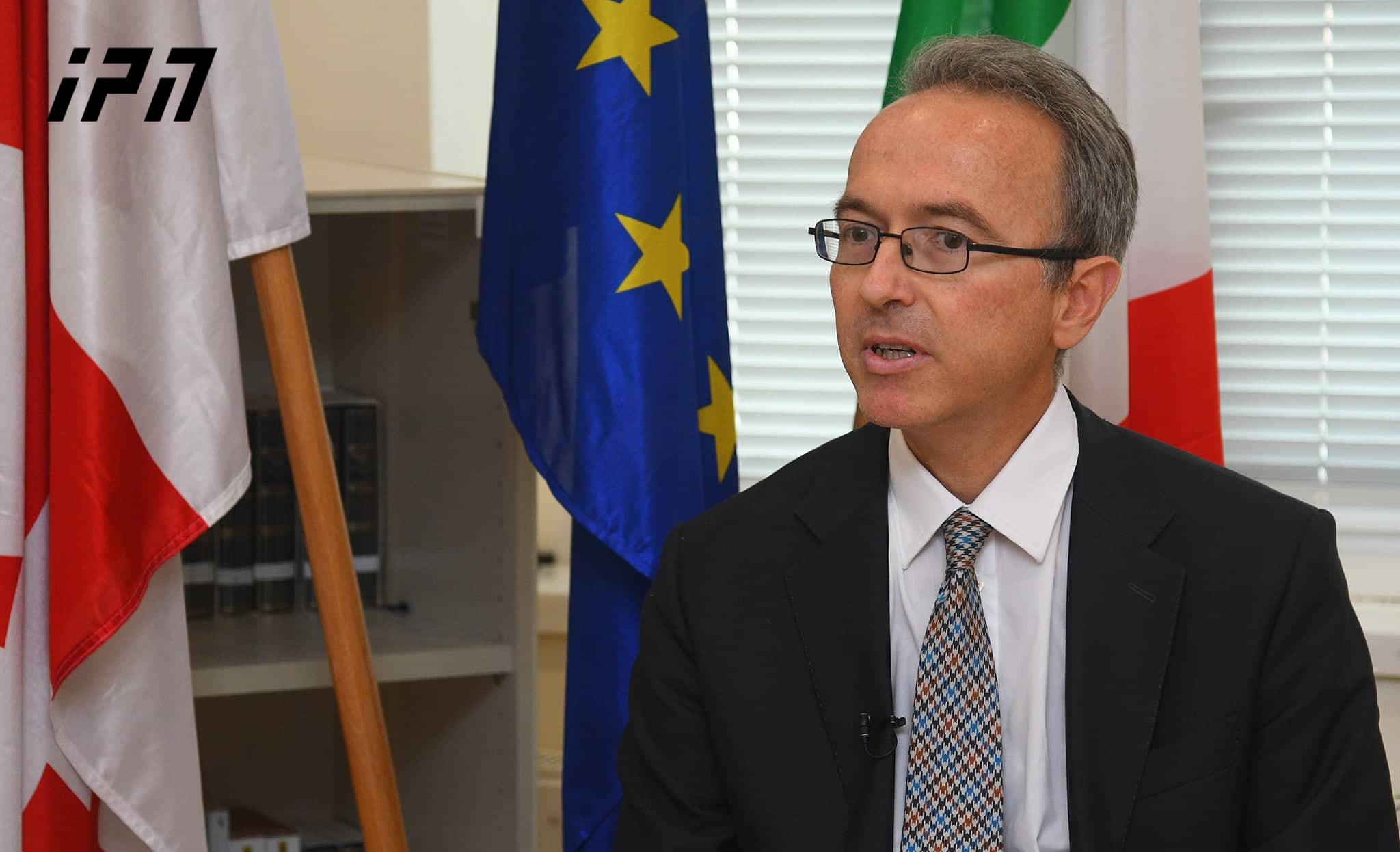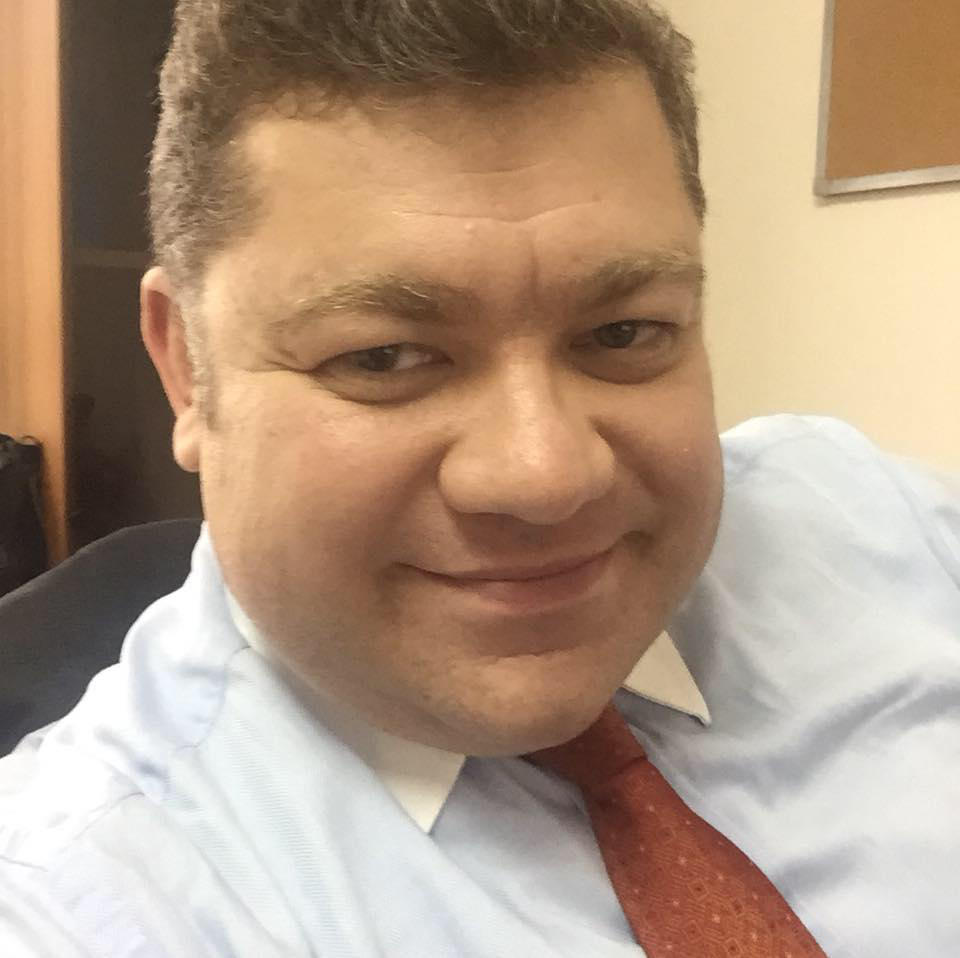Italian Ambassador: A lot of things can be done together by political actors in Georgia if a certain way of attacking each other and presenting or misrepresenting each other can be somehow reversed - you can start from small things

Georgia needs the support of all 27 member states of the European Union to obtain EU candidate status. Italy enjoys a third place in the European Union in terms of political and economic weight. In addition, Italy is one of the founder states of the EU. It is also a member of the G7 and as a result, Italy has one of the leading roles in international politics. The European integration of Georgia, the constant attempts of the so-called officials of Russia-occupied Abkhazia and "South Ossetia" to gain a foothold in Italy, and the current governmental crisis in Rome - Italian Ambassador to Georgia, Enrico Valvo, discussed these and other issues in an exclusive interview with the InterPressNews.
The vast majority of the population of Georgia aspires their country to be a member of the European Union. This aspiration is clearly shown in the latest public opinion polls as well as in the several large-scale pro-EU rallies, which were held at the central avenue of the capital Tbilisi during the last two months. The ruling Georgian Dream party says that they are committed to obtaining EU membership for Georgia. Based on your observations, is the governing party doing its best to implement the 12 recommendations of the European Commission? Do you believe that the Georgian Dream is really willing to bring Georgia closer to the EU? How effective is the ruling party in seizing this unique opportunity for the country?
Let me tackle this question from a slightly different angle. As you said, that is an aspiration, which is the aspiration of 85% of the population of Georgia, and it is also the aspiration, as far as I can hear and understand, of all political forces in Georgia. So the real point is how much will all political forces be able to find the courage, the ability, the willingness to operate together to assess the twelve priority areas which were identified by the European Commission and supported by the European Council. This is the very point. Of course, the government has a major responsibility because it is the government, but everybody has to play its role in the game. The two key words are inclusiveness and sharing of responsibility.
Irakli Kobakhidze, the chairman of the Georgian Dream, said that the departing EU ambassador, Carl Hartzell, played only a negative role in the relations between Georgia and the European Union and he expressed hopes that the future EU Ambassador would "act differently". Nikoloz Samkharadze, the chairman of the Foreign Relations Committee, said that Carl Hartzell could have worked better in order for Georgia to get candidate status. On the contrary, the United National Movement, Georgia’s largest opposition party, thanked the Ambassador of the European Union to Georgia, Carl Hartzell, for his work in a public statement. Besides, Giorgi Gakharia, the former Georgian PM and currently chairman of one of the opposition parties, strongly condemned ‘Georgian Government’s bullying of ambassadors’. How would you assess the work of the departing EU ambassador, Carl Hartzell? Why is the ruling Georgian Dream party unsatisfied with Mr. Hartzell’s work? And how sensible is it for the head of the governing party to make such kind of comments regarding your fellow ambassador?
Of course, it's not very productive to my mind to comment on comments. I don't think that is basically my role. And everybody has a freedom of expression to make their own assessment which is guaranteed by the Constitution. Of course, I have a specific perspective on the work of departing Ambassador Carl Hartzell, which is a perspective that has to do with coordination on substantial issues which always takes place between the head of the EU delegation and the ambassadors of EU member states posted in the country on relevant matters. And my assessment is different from the one you quoted.

Why are the high-level Georgian government officials as well as politicians of the ruling Georgian Dream party and their affiliates constantly hinting at the West dragging Georgia into a war. What do you think is the intention of the Georgian government or Georgian Dream? Why do they spread this narrative in the Georgian public?
Well, I think that the narrative of dragging Georgia into the war has nothing to do with the intentions of the Italian government for sure, but also nothing to do with the intentions of the government of any of our allied countries or EU member states. What we are trying to do is to avoid spillover of the conflict, and we do our very best to have the unjustified and unprovoked Russian aggression finish as soon as possible. I can confirm that there is no intention on our side to drag Georgia into the war.
The de-polarization is the number one recommendation of the European Commission for Georgia in order to obtain EU candidate status. What can you recommend the Georgian politicians to de-polarize and detox the political environment?
This is a really important point, because a lot of other points depend on this. A lot of things can be done together by political actors in Georgia if a certain way of attacking each other and presenting or misrepresenting each other can be somehow reversed. How to do this? It's not to me to give specific advice. I think that you can start from small things, you can start from cooperation on concrete issues, and you can start by trying to use a different narrative towards each other.
The breakaway Georgian regions of Abkhazia and "South Ossetia" are trying for quite a long time to gain a foothold in different western countries, especially in Italy. Let me just remind you of some of such kind of attempts: In February of this year, a press conference was held in the Italian Parliament by MP Matteo Dall'Osso, on the topic "The right of peoples to self-determination. Abkhazia and Greater Europe", in which so-called president of occupied Abkhazia, Aslan Bzhania, took part and used this opportunity for his Georgianophobic comments.
There were several cases when the representatives of the Russia-backed regimes of Abkhazia and "South Ossetia" met local authorities, mayors of different Italian towns, the members of the Italian Parliament, to somehow get their support.
Additionally, over the past years, there were several cases when de facto governments of Georgia’s breakaway regions signed agreements, memorandums of cooperation, or friendship protocols with the Italian cities as well as the participation of Sokhumi or Tskhinvali regimes in the international exhibitions in your country.
For example, in 2015, Anatoli Bibilov, then-speaker of the de facto parliament of "South Ossetia", visited Italy and established a good relationship with the then-Italian parliamentary opposition party “Lega Nord”, and even received a promise from the leader of this party Matteo Salvini to recognize the independence of "South Ossetia" in a vote in the Italian Parliament in the near future.
Besides, there were cases when the de-facto ministers of foreign affairs of Abkhazia and "South Ossetia" alongside other representatives of puppet regimes visited Italy on an "official visit".
Additionally, back in November 2017, the representation of Abkhazia was opened in Italy. Before, In March 2016, the representative office of "South Ossetia" was opened in Rome, having no diplomatic status.
My question is why do the representatives of Russia-backed breakaway regions of Georgia try so hard to gain their foothold in Italy? What are you doing to prevent their illegal activities in your country and how come the so-called ministers and other high-ranking officials of Abkhazia and South Ossetia regimes manage to travel to Italy? What kind of passports do they use to enter your country or why don’t you impose a travel ban on those so-called officials at all? Why aren’t they declared as a ‘persona non grata’?
Let me start from the general to get back to the concrete. In general terms, we state constantly that we completely and absolutely support Georgia’s sovereignty and territorial integrity within its internationally recognized borders. This means, of course, that the so-called de facto governments are in no way recognized by us. We support the policy of non-recognition of the separatist entities. We support Georgian initiatives in the UN on the IDPs and all other Georgian initiatives which have to do with the consistent policy of recognition of Georgian sovereignty on its whole territory. Again in general terms, we also very much appreciate the strategy of Georgia which pursues reintegration through exclusively peaceful means. All the episodes that you quoted have to do either with single members of Parliament or with local authorities which have a guarantee from the constitution of independence from the government. The other point is that each time that those episodes took place there was a clear distancing from the government which stated with full clarity that those initiatives have nothing to do with the position of the Italian government, which is not changing and it's not going to change. This is the fact as it is.
You quoted the video link of the so-called head of separatist region of Abkhazia organized by a member of the Italian parliament. In that case, there was a clear explanation from the President of the Italian Parliament that such initiative had nothing to do with the Parliament as an institution. And there was also a clear press release from the head of the fraction to which the MP belonged that it was an individual initiative of the single MP. This fraction also stated that the fraction itself does not support it because it supports the policy of the Italian government.

Given the Russian threats, what are the perspectives of Georgia and Ukraine joining NATO in the coming future? Does Rome reaffirm its commitment to the 2008 Bucharest Summit decision on Georgia and Ukraine? Against the backdrop of the ongoing Russian invasion of Ukraine, is Italy still supporting the membership of these two post-Soviet countries in NATO?
We remain committed to the open door policy. Yes, this was stated pretty clearly in the summit in Madrid and of course, we concurred with the opinion of all allies that the open door policy stays firm.
Italy presented its four-point peace plan amid the ongoing Russian invasion of Ukraine. According to the Istituto Affari Internazionali, Italian international relations think tank, Rome’s ambitious peace plan received little international recognition, the plan failed to impress the leaderships in both Ukraine and Russia. Why did your peace plan turn out to be unsuccessful and how can Italy continue its efforts to bring an end to President Putin’s war in Ukraine?
Let me put things a little bit in perspective with some general remarks on our action towards unjustified and unprovoked Russian aggression to Ukraine. From the very beginning, we have supported Ukraine in every possible way - political, economic, humanitarian and even military. This is because what happened was totally unacceptable and unjustifiable. Of course, we are not convinced that we should stop striving for a diplomatic solution. Of course, conditions have to mature for a diplomatic solution and a diplomatic solution has to be a solution which is first of all acceptable and accepted by the Ukrainians. We are going to support consistently Ukraine as long as those conditions are not there. And within this support, I have also to quote sanctions which are an important part of our efforts to diminish the ability of Russia to wage its war against Ukraine. One very last point on this where we are very much supporting international efforts, particularly by the UN, regards the unblocking of wheat which is stored in the Ukrainian ports and cannot reach its final destination because of Russian impediment. In this case, we think this is something which has to be very urgently addressed and the only reasonable way to address it full-scale is by diplomatic means because this risks creating further global consequences and really dramatic effects worldwide.
Georgia and Italy are celebrating the 30th anniversary of their diplomatic ties this year. What do you think about political, economic, military, cultural, and educational ties between the countries?
The cooperation is very good and it's increasing. Starting from a political point of view, we had respective state visits. So our President was here on a state visit in July 2018 for the first time ever and President Zurabishvili was in Rome on restitution state visit in June this year, several years after the first state visit of a Georgian President to Rome which was the one of President Shevardnadze in 1997. In both cases, they were substantial visits. In Rome President Zurabishvili met of course the President, the Prime Minister, the two heads of the relevant chambers of Parliament - the Chamber of Deputies and the Senate of the Republic - and the mayor of Rome. In all cases, they had very substantial talks and most of it was not only about bilateral relations but it was also about the European perspective for Georgia. And I would like to quote what my President said on that occasion - “It is simply logical that Georgia wants to revert where it belongs and we support it”.
So political dialogue is pretty intense at the highest level. On economy, there are several Italian companies which are contributing to infrastructure development, tourism development and agricultural development in Georgia and we are willing to do more. A couple of years ago, we reopened the trade office desk inside the Embassy in order to promote business-to-business contacts even further. On culture, yes, that's very pleasant part of our relations because there is a great interest here in Georgia for Italian culture and there is also corresponding developing interest for Georgian culture in Italy. This has to do with several factors. It has also to do with the fact that a big Georgian community of about 30,000 people is working in Italy and is very well integrated in the Italian society, contributing to our welfare and to the welfare of Georgia. By the way, Italy is the second country for remittances to Georgia. It's a pleasure for me to note that more than 6000 Georgian students are studying Italian as second language in over 50 schools in the private and public school system in Georgia.
From the military point of view, we had an acceleration. We had last year the first visit ever of the head of defense of Italy to Georgia in September. And we have started to increase our participation in exercises held in Georgia. All over a long span of time, we have contributed to the overall efforts of the Allies to raise the standards of Georgian armed forces, including through contribution to the Defense Institution Building School and to the NATO-Georgia Joint Training and Evaluation Center.
Italy is in a political crisis again, which is no stranger to your country as since the end of World War II in 1945, Italy has had 69 governments, with an average of one every 1.11 years. Why do Italian Governments collapse so easily and why is your political system so fragile and unstable?
Well, what is sure is that as it is the case for previous government changes, everything always happens in a very well-defined constitutional framework. And of course, the relevant main lines of our foreign policy do not change from government to government. So they are very clearly, since the end of the Second World War, anchored in strong transatlantic links and strong support as a founding member to have further integration in the European Union. So, as you say, the governments don't last very much, but policies are extremely consistent from government to government.
Tornike Kakalashvili
InterPressNews
